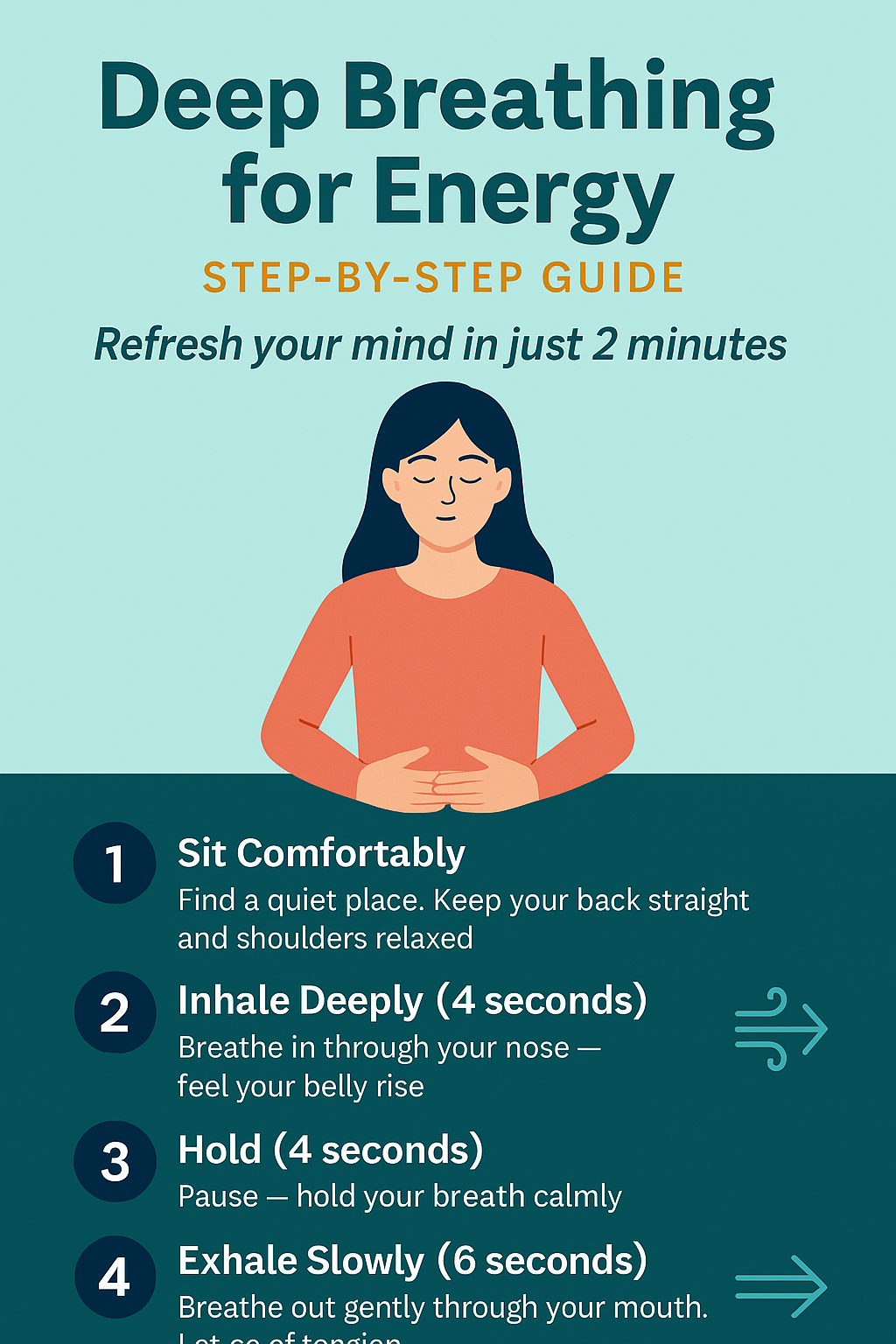Deep Breathing for Energy
Deep breathing is a simple yet powerful technique that can significantly enhance your energy levels, reduce stress, and improve overall well-being. In today’s fast-paced world, where many of us are constantly on the go, taking a moment to focus on our breath can make a world of difference. This article explores the benefits of deep breathing for energy, the science behind it, and practical techniques to incorporate it into your daily routine.
What is Deep Breathing?
Deep breathing, also known as diaphragmatic or abdominal breathing, involves taking slow, deep breaths that fill the lungs completely. Unlike shallow breathing, which is common when we are stressed or anxious, deep breathing engages the diaphragm and promotes a fuller exchange of oxygen and carbon dioxide.
Benefits of Deep Breathing
- Increases Oxygen Supply: Deep breathing allows more oxygen to enter the body, which is essential for energy production. Increased oxygen levels can enhance physical performance and mental clarity.
- Reduces Stress: Engaging in deep breathing activates the parasympathetic nervous system, which helps calm the body and mind. This reduction in stress can lead to improved focus and productivity.
- Enhances Mood: Deep breathing can stimulate the release of endorphins, the body’s natural feel-good hormones. This can lead to improved mood and a greater sense of well-being.
- Improves Circulation: By promoting better oxygenation of the blood, deep breathing can improve circulation, which is vital for delivering nutrients and energy to cells throughout the body.
- Boosts Energy Levels: The combination of increased oxygen intake and reduced stress can lead to a noticeable boost in energy levels, making it an effective tool for combating fatigue.
The Science Behind Deep Breathing
Deep breathing influences the body in several ways:
- Oxygen and Carbon Dioxide Exchange: When you breathe deeply, you increase the volume of air entering your lungs, which enhances the exchange of oxygen and carbon dioxide. This process is crucial for cellular respiration, where cells convert glucose and oxygen into energy.
- Nervous System Regulation: Deep breathing activates the vagus nerve, which plays a key role in regulating the autonomic nervous system. This activation promotes relaxation and reduces the fight-or-flight response associated with stress.
- Hormonal Balance: Deep breathing can help balance hormones, particularly cortisol, which is often referred to as the stress hormone. Lowering cortisol levels can lead to improved energy and mood.
Techniques for Deep Breathing
Incorporating deep breathing into your daily routine is easy. Here are a few techniques to get you started:
1. Basic Deep Breathing
- Find a comfortable position: Sit or lie down in a quiet place.
- Inhale deeply: Breathe in slowly through your nose for a count of four, allowing your abdomen to rise.
- Hold: Retain your breath for a count of four.
- Exhale: Breathe out slowly through your mouth for a count of six.
- Repeat: Continue this cycle for 5-10 minutes.
2. Box Breathing
- Inhale: Breathe in through your nose for a count of four.
- Hold: Hold your breath for a count of four.
- Exhale: Breathe out through your mouth for a count of four.
- Hold: Hold your breath again for a count of four.
- Repeat: Perform this cycle for several minutes.
3. 4-7-8 Breathing
- Inhale: Breathe in through your nose for a count of four.
- Hold: Hold your breath for a count of seven.
- Exhale: Breathe out through your mouth for a count of eight.
- Repeat: Continue for four cycles.
Incorporating Deep Breathing into Your Day
To reap the benefits of deep breathing, try to integrate it into your daily life:
- Morning Routine: Start your day with deep breathing exercises to set a positive tone.
- Breaks at Work: Take a few minutes during breaks to practice deep breathing, helping to recharge your energy.
- Before Bed: Engage in deep breathing before sleep to promote relaxation and improve sleep quality.
Conclusion
Deep breathing is a simple yet effective technique that can enhance your energy levels and overall well-being. By incorporating deep breathing exercises into your daily routine, you can reduce stress, improve focus, and feel more energized throughout the day. Take a moment to breathe deeply and experience the transformative power of your breath!

